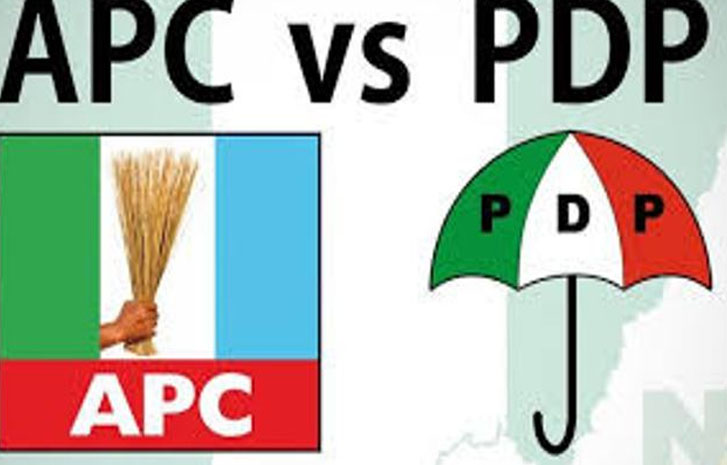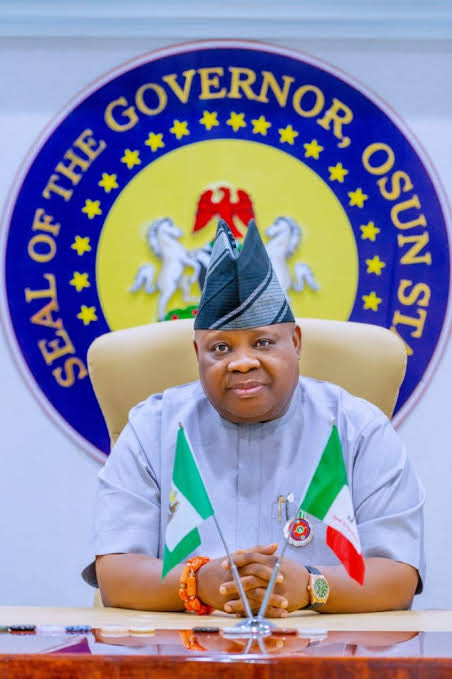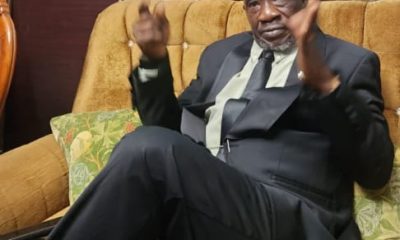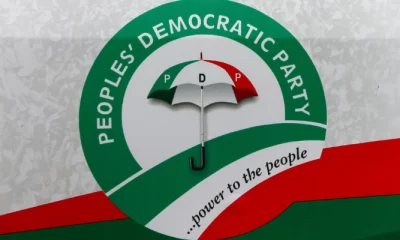POLITICS
2023: As APC, PDP Sink into Crisis

By Jude Opara
As the 2023 general elections draw closer, there are no doubts that the two dominant political parties in Nigeria are currently in a dirty in-fighting that could threaten their very foundation. Interestingly, the crisis rocking the ruling-All Progressives Congress (APC) and the main opposition-Peoples Democratic Party (PDP) nothing but self implosion occasioned by the illicit struggle for power and control.
While it is normal in any political setting for politicians to struggle for power, what makes what is happening in both the APC and the PDP strange is the fact that both political parties usually main the same pattern.
They usually campaign with high sounding promises and when they get into office, they will shut out the electorates that elected them into power. They will operate like masters over lording it over their subjects, but with few months to another circle of elections, they will begin to warm themselves back to the people.There is really no political ideology that one can say is a hallmark of the two political parties because usually you could see a political officer jumping from one party to then other depending on his selfish calculation and interest.
The APC clinched power in 2015 when General Muhammadu Buhari defeated the incumbent President Goodluck Jonathan of the PDP. One would have thought that given the robust campaign and promises made by the APC, their administration would be a sharp contrast with what made Nigerians to reject the PDP.
However, few years down the line, it has been clearly proven that there is really no difference between the two parties except in their names and logos. The APC has been like an accident waiting to happen because after their electoral victory, most of the party stakeholders cried out that they were ignored especially in appointments and placements.
President Buhari was said to have recoiled to his inner circle appointing mainly his friends and allies while ignoring most of those who fought for his emergence as the president. In fact at a point, his wife, Mrs. Aisha Buhari queried where most of the people now calling the shots now were during the campaigns.
After the 2015 victory, some elements in the APC began the policy of fencing some other stakeholders. For instance, there was the leaked memo by Governor Nasir El-Rufai of Kaduna warning President Buhari to be wary of the acclaimed national leader of the party and former governor of Lagos State, Asiwaju Bola Tinubu. In deed Tinubu used to be a frequent caller at the Aso Rock but shortly after, he was more or less fenced off. There was the rumour that the President was keeping him at arm’s length.
Tinubu had worked very hard for the emergence of Buhari as the president and also immediately after their electoral victory, he ensured the ouster of the former Chairman of the APC, Chief John Oyegun and the enthronement of his loyalist and ally, Comrade Adams Oshiomhole.
Oshiomhole who had just left office as the governor of Edo state began operating as the lord of Manor, running the party more or less like his private empire and always talking as if he had immunity from removal. His overbearing influence came to a head in 2020 when he insisted that his estranged ally, Governor Godwin Obaseki must not re-contest the Edo state governorship election. In his attempt to replay the record of Lagos state where Tinubu was said to have rejected the former governor of Lagos state, Akinwunmi Ambode from returning, Oshiomhole ignored all pleas to allow Obaseki be but all to no avail.
The disqualification of Obaseki by the APC forced him to join the PDP who wasted no time in handing him their ticket to represent them in the election. And it is instructive to note that angered by Oshiomhole’s obstinacy, even some APC governors secretly supported Obaseki to win.
Shortly after the victory of the PDP in Edo state, the governors moved against Oshiomhole and the National Executive Committee (NEC) of the APC met in the Presidential Villa in June and summarily sacked the National Working Committee (NWC) led by the former Edo state governor.
The APC in their wisdom appointed a Caretaker/Extraordinary Convention Planning Committee (CECPC) headed by the Governor Mai Mala Buni of Yobe state. The CECPC was given six months to organize and conduct a convention where a substantive NWC was to be elected by December, 2020. But more than one year after, Buni and his men are still occupying the National secretariat of the APC.
In fact Buni and his team gave reasons to believe they were never intended to leave in six months because as soon as he arrived at the party’s secretariat, he began by renovating the office of the National Chairman. Many analysts saw that as a sign that he was not ready to leave office soon.
But the chicken seems to have come home to roost because of the Supreme Court verdict on the Ondo state governorship election where the apex court ruled that Governor Rotimi Akeredolu of the APC won the Ondo 2020 election.
The tribunal dismissed the joint petition of Eyitayo Jegede and the PDP lodged against the declaration of Akeredolu of the APC as the valid winner of the Ondo gubernatorial contest.
Jegede and the PDP had in their case, queried the legal validity of Akeredolu’s nomination by the national caretaker committee of the APC headed by Mai Mala Buni, Yobe governor.
They specifically asked the court to determine whether Buni, as a sitting governor, could double as national chairman of the APC to sign Akeredolu’s nomination form for the governorship election.
According to section 183 of the Nigerian constitution, “the governor shall not, during the period when he holds office, hold any other executive office or paid employment in any capacity whatsoever”.
Akeredolu narrowly escaped in a split verdict of 4-3. It was said that the governor got judgement because the plaintiffs did not join Buni in their suit.
Minister of state for Labour and a Senior Advocate of Nigeria, Festus Keyamo had advised the party against going ahead with the Ward Congresses last week. Keyamo advised that Buni should resign to give the party the opportunity to put somebody who may not have the baggage Buni has as a sitting governor.
Surely, going into the events that will lead to the next general elections, already different factions are germinating within the APC and surely this will not augur well for the party and also the country.
In the PDP, the story is no better because since losing power in 2015, the party had failed to play the critical role of an opposition party. They have failed to take advantage of the numerous errors of the APC to warm themselves into the hearts of Nigerians.
What they have been doing is to hope upon hopes, believing that Nigerians will vote for them given the failure of the APC. Only intermittently the National Publicity Secretary of the PDP, Kola Ologbondiyan will issue statements attacking the APC and their policies.
Many stakeholders have made calls for the Chairman of the PDP, Prince Uche Secondus to resign, but somehow the Rivers state administrator has managed to hold on to his position.
But on Tuesday, the news filtered in that seven members of the NWC had resigned their position sighting highhandedness and lack transparency on the part of the party leadership. The truth is that the mass resignation is nothing but a sign that there are powers behind that action and it is aimed at forcing Secondus out.
In the last one year, the PDP has lost three governors and several members of the parliament both at the national and state levels.
Many analysts believe that one real problem the PDP is having is the fact that since after losing power in 2015, former President Goodluck Jonathan has not really played that role as the leader of the party. The former President Olusegun Obasanjo publicly tore his membership card and had said he no longer plays partisan politics. So the seeming absence of a figure in the mould of a former president has left the party in the cold.
It is only Governor Nyesom Wike of River State that is now playing the real opposition by intermittently challenging actions and policies of the federal government. The other PDP governors are simply seen but not heard.
Yes, many people have also blamed Wike for the emergence of Secondus because during the convention, he threatened the party until he had his way of enthroning his kinsman as the Chairman.
So going into the 2023 elections, there are huge uncertainties over which between these two parties that Nigerians can trust, given the fact that they are merely two sides of the same coin. There have been rumours that people like Tinubu who may not have his way in the APC will team up with some other aggrieved politicians from both the APC and the PDP to form a third force that could wrestle power from the two dominant political parties.
POLITICS
Anambra: INEC Registers 96,085 New Voters, Extends CVR by Three Days

The Independent National Electoral Commission (INEC) said it has registered 96,085 new voters in nine days and extended the exercise by three days in Anambra.
The commission disclosed this in a statement by Sam Olumekun, National Commissioner and Chairman, Information and Voter Education Committee, on Thursday in Abuja, after its weekly meeting.
He said that on the preliminary stage of the CVR, 56,017 representing 58 per cent of new registrants were female while 50,429 52 representing 48 per cent were young people between the ages of 18 and 34.
“The commission is pleased with the turnout of registrants in Anambra and the peaceful conduct of the Continuous Voters Registration (CVR) in all the 326 registration centres in the state.
“As of yesterday, Wednesday, 96,085 new voters have successfully registered in nine days. On average, the Commission registered over 10,600 voters per day.
“In addition, 12,595 voters applied for transfer of their registration both within and outside the state while 7,061 persons applied for the update of their records or the replacement of their damaged or lost Permanent Voters Cards (PVCs).
“The CVR in Anambra ends today. However, in response to appeal from citizens, the Commission hereby extends the exercise for three more days. It will now end on Sunday, July 20,” he said.
Olumekun said that the commission would thereafter display the register for claims and objections by citizens as provided by law.
This, according to him, will be followed by a further clean-up of the data using the Automated Biometric Identification System (ABIS).
“Subsequently, the detailed breakdown of the new registrants by age, gender, occupation and disability will be published for public information,” he said.
Olumekun also disclosed that INEC had received five more letters of intent from associations seeking registration as political parties.
According to him, the new application brings the number received so far by the commission to 134.
Olumekun stated that the details of the new associations, indicating their proposed names, acronyms, logos, addresses and interim leaderships were already published on INEC website and other platforms for public information.
He said that INEC would continue to keep the citizens up to date on all its activities.
POLITICS
PDP Stakeholders Olorunda Pass Vote of Confidence on Gov Adeleke

From Ayinde Akintade, Osogbo
The Olorunda Peoples’ Democratic Party, PDP, Stakeholders has passed vote of confidence on Governor Ademola Adeleke of Osun State, re-affirm loyalty, and pledge to support his future political alignment.
Following a critical meeting of the Olorunda Local Government Stakeholders of the Peoples Democratic Party (PDP), held at the residence of the Apex Leader, Senator Dr.
Oluwole Alabi, stakeholders across the political spectrum unanimously passed a vote of confidence on the Executive Governor of the State, His Excellency, Senator Ademola Jackson Nurudeen Adeleke.The meeting, chaired by Senator Dr. Oluwole Alabi and moderated by Aare Ganiyu Ayobami Olaoluwa Asejere, brought together key political functionaries, state appointees, and party executives at state, local, and ward levels from Olorunda Local Government area of the state.
In the communiqué made available to our Correspondent in Osogbo the Osun State capital shortly after the meeting, the stakeholders collectively expressed their unwavering loyalty and unflinching support to Governor Adeleke and committed themselves to following his political direction in the interest of continued progress and good governance in Osun State.
The communiqué reads in part
“We, the undersigned leaders and stakeholders of the PDP in Olorunda Local Government area, having extensively deliberated on the current political climate, hereby pass a unanimous vote of confidence in the sterling leadership of His Excellency, Senator Ademola Jackson Nurudeen Adeleke
“We commend his people-oriented governance style, visionary leadership, and impactful delivery of the Imole developmental agenda, which stands as the most transformative in the history of Osun State.
“As loyal party stakeholders, we reaffirm our total and unshaken loyalty to Governor Adeleke, who has continuously demonstrated commitment to inclusive development, good governance, and service to humanity.
“We further resolve to follow His Excellency’s political direction and align with his future political choices irrespective of platform, believing in his judgment as the authentic custodian of the Imole mandate and the symbol of progress in our dear state.
“We stand united behind Governor Adeleke’s leadership and remain resolute in our commitment to actualizing his vision for Osun State, now and beyond 2030.”
“This communiqué reflects the collective will of the leadership and stakeholders of Olorunda PDP and symbolises their unwavering readiness to continue working under the guidance of Governor Adeleke for the continued upliftment of Osun State”.
The meeting has in attendance, Senator Dr. Oluwole Alabi, Aare Ganiyu Ayobami Olaoluwa Asejere, Rep. Maruff Adewale Gangaria, Dr. Muyiwa Oladimeji, Elder Funsho Isola, Hon. Olaide Ajibola, High Chief Apesin Olanrewaju Akolade, Hon. Obafemi Akolade, Hon. Ademola Nurudeen Hamzat, Hon. Nathaniel Ojetola, and Hon. Kunle Olaniyan while the communique was duly signed by all of them.
POLITICS
2027: Why Governor Sule Must Not Exit the State Yet

By Abel Zwanke, Lafia
As 2027 approaches and the end of Governor Abdullahi Sule’s second term draws nearer, political voices across Nasarawa State are growing louder not in the usual clamor for succession, but in a rare, unified call for continuity. From political stakeholders and traditional rulers to civil society actors and the youth, a consensus is emerging: Governor Sule must not exit the political stage just yet.
Though his constitutional term as governor winds down, many believe his experience, credibility, and technocratic leadership are needed beyond 2027—either in the Senate or in a stabilizing role within the All Progressives Congress (APC).
From Akwanga to Nassarawa Eggon and Wamba which are his immediate constituency, voices are rising—not just within the ruling All Progressives Congress (APC), but also from non-partisan stakeholders and everyday citizens—urging Governor Sule to remain actively involved in shaping Nasarawa’s political and developmental future beyond 2027, even if not from the seat of power in Government House.
A Legacy in Progress
Governor Abdullahi Sule, a technocrat with roots in the private sector, has been lauded for running a government built on planning, transparency, and purposeful development. His second term in office has seen vast investments in infrastructure, agriculture, health, education, and industrialisation.
David Sylvester, a political analyst based in Lafia, noted:
“What Sule has done is lay a template that is difficult to reverse. The people are seeing real governance—not just speeches. That’s why the public wants him to remain, perhaps in the Senate or as a stabilizing figure within the party.”
The recent endorsement of Governor Sule by stakeholders from Nasarawa North Senatorial District further validates this momentum. At a political gathering in Akwanga, party elders and youth leaders alike resolved to back him for a senatorial bid.
Dr. Kassim Muhammed Kassim Executive Chairman of the Nasarawa State Universal Basic Education Board (NSUBEB), one of the strongest voices in this call remarked that:
“This is not just about politics. We are talking about someone who has brought credibility to governance. Nasarawa cannot afford to lose that influence, whether in the Senate or as a guiding force.”
Dr. Kassim, also described Governor Sule as “a stabilizer in Nasarawa’s democratic journey.”
“Governor Sule is not only a performer; he is a symbol of political maturity, calmness, and inclusive governance,” Kassim stated during a stakeholders’ meeting in Akwanga.
“We need him in the Senate or any strategic position to ensure the continuity of this leadership philosophy that has brought peace and progress to our state.”
Kassim’s sentiments echo what many in the North Central state now describe as a “popular mandate” for Sule to continue representing the people, not necessarily from the Government House, but from Abuja, where his voice and connections could do even more for Nasarawa.
Influence, Preserving Vision
Stakeholders view the Senate as the most logical next step for the governor. With his strong background in engineering, finance, and public policy, analysts also believes he could play a vital role in national policymaking, especially around mining regulation, agricultural development, and intergovernmental cooperation.
Maryam Abdullahi, a civil society coordinator in Keana, explained:
“We’ve seen what he did with the Dangote sugar refinery, lithium investments, and agribusiness zones. With access to the Senate, Nasarawa stands to benefit even more.”
Observers also point to Sule’s rising influence within the Tinubu-led APC government as another reason to retain his relevance beyond 2027.
“Sule is seen as a strategic player in North-Central politics—his calm, development-first approach gives him credibility not just within Nasarawa, but also in Abuja.”
Balancing Zoning, Stability, and Merit
Of course, politics in Nasarawa cannot be divorced from the longstanding tradition of power rotation. Already, conversations around zoning the governorship seat to the Western zone have gained traction.
But stakeholders caution that zoning should not come at the cost of performance.
Dr. Madaki Williams, a lecturer and political commentator, noted: “Zoning has its place, but it must not override competence. Sule’s style of leadership is issue-based, result-driven. That kind of governance shouldn’t be zoned out.”
Many say Governor Sule is uniquely positioned to balance these concerns—by playing a mentoring role in succession planning, ensuring a candidate with both competence and acceptability emerges.
A local youth leader in Karu, Ibrahim Baba, stated:
“We don’t want a return to the old ways—where politics was about godfatherism and patronage. Governor Sule should help us choose a worthy successor and also represent us at the federal level.”
Civil Society and Youth Join the Chorus
The calls for continued leadership aren’t just political. Civil society groups, especially youth and women’s organisations, say Governor Sule’s administration has given them more inclusion, access, and attention than previous governments.
Programs like the Nasarawa Health Insurance Scheme (NASHIS), mass teacher recruitment, educational infrastructure development, and the revitalization of primary healthcare centres have directly impacted citizens.
Juliet Yakubu, a volunteer with a grassroots health NGO, shared:
“Before now, people died in silence. But under Governor Sule, health centres are functional, and rural areas now have better access to doctors. We need this kind of leadership to continue—even if not in the same office.”
Youth groups also praised the governor’s investments in skill acquisition, small enterprise grants, and digital initiatives, urging that such policies must not be discarded after his tenure ends.
Risks of a Power Vacuum
Some political observers warn that Nasarawa could face a regression if the transition from Sule’s administration is not well managed. With multiple interests jostling for control, both within and outside the APC, a power vacuum could reverse much of the developmental progress.
“Without a steady hand to manage the transition, we may end up with infighting, weak governance, and even a divided house in 2027,” warned Yusuf Danlami, a political journalist.
That’s why many see the governor’s continued presence, whether in the Senate, as a mentor, or national policy figure as vital to preserving unity and focus.
Beyond the Office, A Symbol of Governance Reform
Even those who believe Sule should step aside from direct elective office concede that his influence must remain part of the Nasarawa equation.
As Daily Asset editorialized in a recent opinion:
“Governor Sule has redefined what it means to lead in Nasarawa. His legacy goes beyond roads and buildings; it’s about systems that work. That kind of leadership cannot be left to chance.”
The editorial continued, noting that Nasarawa needs “a visionary elder statesman who can watch the house and guard the blueprint.”
The People Have Spoken
Whether it is in the calm voice of an elder in Akwanga, the hopeful chants of youth in Nassarawa Eggon and Wamba or the precise arguments of analysts in one message stands out: Governor Sule’s job is not yet done.
From fiscal transparency to rural development, stakeholder consensus is growing that Nasarawa must not drift into uncertainty. As the 2027 political cycle begins, the state faces a choice—either to allow reforms to take root or risk losing the governance gains achieved.
And for many citizens, the solution lies in not just who takes over but who remains to guide, mentor, and safeguard the future.
“He doesn’t need to run for governor again,” said Hauwa Ahmed, a trader in Lafia. “But let him go to the Senate. Let him still be there for Nasarawa.”
Nasarawa still needs Sule beyond 2027.
| ReplyReply allForwardAdd reaction |


























